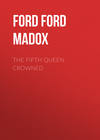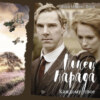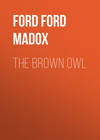Читать книгу: «The Fifth Queen Crowned», страница 9
Whilst she listened a great many thoughts came into her mind – of their youth at home, where indeed, to the grunting of hogs, he had wooed her when she came out from conning her Plautus with the Magister. And at the same time it troubled her to consider where the young Poins had bestowed himself. Maybe he was dead; maybe he lay in a faint.
'It was in our pact,' she said to Culpepper, 'that you should get you gone ever when I would have it.'
'Aye, sure, it was in our pact,' he said.
He closed his eyes as if he would fall asleep, being very weary and come to his desired haven. Above his closed eyes Katharine threw the key of her antechamber on to the bed. She pointed with her hand to that door that the Lady Rochford should undo. If she could get her cousin through that door – and now he was in the mood – if she could but get him through there and out at the door beyond the Big Room into the corridor, before her guard came back…
But the Lady Rochford was leaning far out beyond the window-sill and did not see her gesture.
Culpepper muttered —
'Ah; well; aye; even so – ' And from the window came a scream that tore the air —
'The King! the King!'
And immediately it was as if the life of a demon had possessed Culpepper in all his limbs.
'Merciful God!' the Queen cried out. 'I am patient.'
Culpepper had writhed from her till he sat up, but she hollowed her hand around his throat. His head she forced back till she held it upon the floor, and whilst he writhed with his legs she knelt upon his chest with one knee. He screamed out words like: 'Bawd,' and 'Ilcock,' and 'Hecate,' and the Lady Rochford screamed —
'The King comes! the King comes!'
Then Katharine said within herself —
'Is it this to be a Queen?'
She set both her hands upon his neck and pressed down the whole weight of her frame, till the voice died in his throat. His body stirred beneath her knee, convulsively, so that it was as if she rode a horse. His eyes, as slowly he strangled, glared hideously at the ceiling, from which the carven face of a Queen looked down into them. At last he lay still, and Katharine Howard rose up.
She ran at the old woman —
'God forgive me if I have killed my cousin,' she said. 'I am certain that now He will forgive me if I slay thee.' And she had Culpepper's dagger in her hand.
'For,' she said, 'I stand for Christ His cause: I will not be undone by meddlers. Hold thy peace!'
The Lady Rochford opened her mouth to speak.
'Hold thy peace!' the Queen said again, and she lifted up the dagger. 'Speak not. Do as I bid thee. Answer me when I ask. For this I swear as I am the Queen that, since I have the power to slay whom I will and none question it, I will slay thee if thou do not my bidding.'
The old woman trembled lamentably.
'Where is the King come to?' the Queen said.
'Even to the great gate; he is out of sight,' was her answer.
'Come now,' the Queen commanded. 'Let us drag my cousin behind my table.'
'Shall he be hidden there?' the Lady Rochford cried out. 'Let us cast him from the window.'
'Hold your peace,' the Queen cried out. 'Speak you never one word more. But come!'
She took her cousin by the arm, the Lady Rochford took him by the other and they dragged him, inert and senseless, into the shadow of the Queen's mirror table.
'Pray God the King comes soon,' the Queen said. She stood above her cousin and looked down upon him. A great pitifulness came into her face.
'Loosen his shirt,' she said. 'Feel if his heart beats!'
The Lady Rochford had a face full of fear and repulsion.
'Loosen his shirt. Feel if his heart beats,' the Queen said. 'And oh!' she added, 'woe shall fall upon thee if he be dead.'
She reflected a moment to think upon how long it should be ere the King came to her door. Then she raised her chair, and sat down at her mirror. For one minute she set her face into her hands; then she began to straighten herself, and with her hands behind her to tighten the laces of her dress.
'For,' she continued to Lady Rochford, 'I do hold thee more guilty of his death than himself. He is but a drunkard in his cups, thou a palterer in sobriety.'
She set her cap upon her head and smoothed the hair beneath it. In all her movements there was a great swiftness and decision. She set the jewel in her cap, the pomander at her side, the chain around her neck, the jewel at her breast.
'His heart beats,' the Lady Rochford said, from her knees at Culpepper's side.
'Then thank the saints,' Katharine answered, 'and do up again his shirt.'
She hurried in her attiring, and uttered engrossed commands.
'Kneel thou there by his side. If he stir or mutter before the King be in and the door closed, put thy hand across his mouth.'
'But the King – ' the Lady Rochford said. 'And – '
'Merciful God!' Katharine cried out again. 'I am the Queen. Kneel there.'
The Lady Rochford trembled down upon her knees; she was in fear for her life by the axe if the King came in.
'I thank God that the King is come,' the Queen said. 'If he had not, this man must have gone from hence in the sight of other men. So I will pardon thee for having cried out if now thou hold him silent till the King be in.'
There came from very near a blare of trumpets. Katharine rose up, and went again to gaze upon her cousin. The dagger she laid upon her table.
'He may hold still yet,' she said. 'But I charge you that you muzzle him if he move or squeak.'
There came great blows upon the door, and through the heavy wood, the Ha-ha of many voices. Slowly the Queen moved to the bed, and from it took the key where she had thrown it. There came again the heavy knocking, and she unlocked the door, slowly still.
In the corridor there were many torches, and beneath them the figure of the King in scarlet. Behind him was Norfolk all in black and with his yellow face, and Cranmer in black and with his anxious eyes, and behind them many other lords. The King came in, and, slow and stately, the Queen went down on her knees to greet him. The torch-light shone upon her jewels and her garments; her fair face was immobile, and her eyes upon the ground. The King raised her up, bent his knee to her, and kissed her on the hands, and so, turning to the men without, he uttered, roundly and fully, and his cheeks were ruddy with joy, and his eyes smiled —
'My lords, I am beholden to the King o' Scots. For had he met me I had not yet been here. Get you to your beds; I could wish ye had such wives – '
'The King! the King!' a voice muttered.
Henry said —
'Ha, who spoke?'
There was a faint squeak, a dull rustle.
'My cousin Kat – ' the voice said.
The King said —
'Ha!' again, and incredulous and haughty he raised his brows.
Above the mirror, in the great light of the candles, there showed the pale face, the fishy, wide-open and bewildered eyes of Culpepper. His hair was dishevelled in points; his mouth was open in amazement. He uttered —
'The King!' as if that were the most astonishing thing, and, standing behind the table, staggered and clutched the arras to sustain himself.
Henry said —
'Ha! Treason!'
But Katharine whispered at his ear —
'No; this my cousin is distraught. Speak on to the lords.'
In the King's long pause several lords said aloud —
'The King cried "Treason!" Draw your swords!'
Then the King cast his cap upon the ground.
'By God!' he said. 'What marlocking is this? Is it general joy that emboldens ye to this license? God help me!' he said, and he stamped his foot upon the ground – 'Body of God!' And many other oaths he uttered. Then, with a sudden clutching at his throat, he called out —
'Well! well! I pardon ye. For no doubt to some that be young – and to some that be old too – it is an occasion for mummeries and japes when a good man cometh home to his dame.'
He looked round upon Culpepper. The Queen's cousin stood, his jaw still hanging wide, and his body crumpled back against the arras. He was hidden from them all by wall and door, but Henry could not judge how long he would there remain. Riding through the night he had conned a speech that he would have said at the Queen's door, and at the times of joy and graciousness he loved to deliver great speeches. But there he said only —
'Why, God keep you. I thank such of you as were with me upon the campaign and journey. Now this campaign and journey is ended – I dissolve you each to his housing and bed. Farewell. Be as content as I be!'
And, with his great hand he swung to the heavy door.
PART THREE
THE DWINDLING MELODY
I
The Lady Rochford lay back upon the floor in a great faint.
'Heaven help me!' the Queen said. 'I had rather she had played the villain than been such a palterer.' She glided to the table and picked up the dagger that shone there beneath Culpepper's nose. 'Take even this,' she said to the King. 'It is an ill thing to bestow. Sword he hath none.'
Having had such an estimation of his good wife's wit that, since he would not have her think him a dullard, he passed over the first question that he would have asked, such as, 'I think this be thy cousin and how came he here?'
'Would he have slain me?' he asked instead, as if it were a little thing.
'I do not think so,' Katharine said. 'Maybe it was me he would have slain.'
'Body of God!' the King said sardonically. 'He cometh for no cheap goods.'
He had so often questioned his wife of this cousin of hers that he had his measure indifferent well.
'Why,' the Queen said, 'I do not know that he would have slain me. Maybe it was to save me from dragons that he came with his knife. He was, I think, with the Archbishop's men and came here very drunk. I would pray your Highness' Grace to punish him not over much for he is my mother's nephew and the only friend I had when I was very poor and a young child.'
The King hung his head on his chest, and his rustic eyes surveyed the ground.
'I would have you to think,' she said, 'that he has been among evil men that advised and prompted him thus to assault my door. They would ruin and undo him and me.'
'Well I know it,' Henry said. He rubbed his hand up his left side, opened it and dropped it again – a trick he had when he thought deeply.
'The Archbishop,' he said, 'babbled somewhat – I know not what – of a cousin of thine that was come from the Scots, he thought, without leave or license.'
'But how to get him hence, that my foes triumph not?' the Queen said, 'for I would not have them triumph.'
'I do think upon it,' the King said.
'You are better at it than I,' she answered.
Culpepper stood there at gaze, as if he were a corpse about which they talked. But the speaking of the Queen to another man excited him to gurgle and snarl in his throat like an ape. Then another mood coming into the channels of his brain —
'It was the King my cousin Kate did marry. This then is the Queen; I had pacted with myself to forget this Queen.' He spoke straight out before him with the echo of thoughts that he had had during his exile.
'Ho!' the King said and smote his thigh. 'It is plain what to do,' and in spite of his scarlet and his bulk he had the air of a heavy but very cunning peasant. He reflected for a little more.
'It fits very well,' he brought out. 'This man must be richly rewarded.'
'Why,' Katharine said; 'I had nigh strangled him. It makes me tremble to think how nigh I had strangled him. I would well he were rewarded.'
The King considered his wife's cousin.
'Sirrah,' he said, 'we believe that thou canst not kneel, or kneeling, couldst not well again arise.'
Culpepper regarded him with wide, blue, and uncomprehending eyes.
'So, thou standing as thou makest shift to do, we do make thee the keeper of this our Queen's ante-room.'
He spoke with a pleasant and ironical glee, since it joyed him thus to gibe at one that had loved his wife. He – with his own prowess – had carried her off.
'Master Culpepper,' he said – 'or Sir Thomas – for I remember to have knighted you – if you can walk, now walk.'
Culpepper muttered —
'The King! Why the King did wed my cousin Kat!'
And again —
'I must be circumspect. Oh aye, I must be circumspect or all is lost.' For that was one of the things which in Scotland he had again and again impressed upon himself. 'But in Lincoln, in bygone times, of a summer's night – '
'Poor Tom!' the Queen said; 'once this fellow did wooe me.'
Great tears gathered in Culpepper's eyes. They overflowed and rolled down his cheeks.
'In the apple-orchard,' he said, 'to the grunting of hogs … for the hogs were below the orchard wall…'
The King was pleased to think that it had been in his power to raise this lady an infinite distance above the wooing of this poor lout. It gave him an interlude of comedy. But though he set his hands on his hips and chuckled, he was a man too ready for action to leave much time for enjoyment.
'Why weep?' he said to Culpepper. 'We have advanced thee to the Queen's ante-chamber. Come up thither.'
He approached to Culpepper behind the mirror table and caught him by the arm. The poor drunkard, his face pallid, shrank away from this great bulk of shining scarlet. His eyes moved lamentably round the chamber and rested first upon Katharine, then upon the King.
'Which of us was it you would ha' killed?' the King said, to show the Queen how brave he was in thus handling a madman. And, being very strong, he dragged the swaying drunkard, who held back and whose head wagged on his shoulders, towards the door.
'Guard ho!' he called out, and before the door there stood three of his own men in scarlet and with pikes.
'Ho, where is the Queen's door-ward?' he called with a great voice. Before him, from the door side, there came the young Poins; his face was like chalk; he had a bruise above his eyes; his knees trembled beneath him.
'Ho thou!' the King said, 'who art thou that would hinder my messenger from coming to the Queen?'
He stood back upon his feet; he clutched the drunkard in his great fist; his eyes started dreadfully.
The young Poins' lips moved, but no sound came out.
'This was my messenger,' the King said, 'and you hindered him. Body of God! Body of God!' and he made his voice to tremble as if with rage, whilst he told this lie to save his wife's fair fame. 'Where have you been? Where have you tarried? What treason is this? For either you knew this was my messenger – as well I would have you know that he is – and it was treason and death to stay him. Or, if because he was drunk and speechless – as well he might be having travelled far and with expedition – ye did not know he was my messenger; then wherefore did ye not run to raise all the castle for succour?'
The young Poins pointed to the wound above his eye and then to the ground of the corridor. He would signify that Culpepper had struck him, and that there, on the ground, he had lain senseless.
'Ho!' the King said, for he was willing to know how many men in that castle had wind of this mischance. 'You lay not there all this while. When I came here along, you stood here by the door in your place.'
The young Poins fell upon his knees. He shook more violently than a naked man on a frosty day. For here indeed was the centre of his treason, since Lascelles had bidden him stay there, once Culpepper was in the Queen's room, and to say later that there the Queen had bidden him stay whilst she had her lover. And now, before the King's tremendous presence, he had the fear at his heart that the King knew this.
'Wherefore! wherefore!' the King thundered, 'wherefore didst not cry out – cry out – "Treason, Raise the watch!"? Hail out aloud?'
He waited, silent for a long time. The three pikemen leaned upon their pikes; and now Culpepper had fallen against the door-post, where the King held him up. And behind his back the Queen marvelled at the King's ready wit. This was the best stroke that ever she had known him do. And the Lady Rochford lay where she had feigned to faint, straining her ears.
With all these ears listening for his words the young Poins knelt, his teeth chattering like burning wood that crackles.
'Wherefore? wherefore?' the King cried again.
Half inaudibly, his eyes upon the ground, the boy mumbled, 'It was to save the Queen from scandal!'
The King let his jaw fall, in a fine aping of amazement. Then, with the huge swiftness of a bull, he threw Culpepper towards one of the guards, and, leaning over, had the kneeling boy by the throat.
'Scandal!' he said. 'Body of God! Scandal!' And the boy screamed out, and raised his hands to hide the King's intolerable great face that blazed down over his eyes.
The huge man cast him from him, so that he fell over backwards, and lay upon his side.
'Scandal!' the King cried out to his guards. 'Here is a pretty scandal! That a King may not send a messenger to his wife withouten scandal! God help me…'
He stood suddenly again over the boy as if he would trample him to a shapeless pulp. But, trembling there, he stepped back.
'Up, bastard!' he called out. 'Run as ye never ran. Fetch hither the Lord d'Espahn and His Grace of Canterbury, that should have ordered these matters.'
The boy stumbled to his knees, and then, a flash of scarlet, ran, his head down, as if eagles were tearing at his hair.
The King turned upon his guard.
'Ho!' he said, 'you, Jenkins, stay here with this my knight cousin. You, Cale and Richards, run to fetch a launderer that shall set a mattress in the ante-chamber for this my cousin to lie on. For this my cousin is the Queen's chamber-ward, and shall there lie when I am here, if so be I have occasion for a messenger at night.'
The two guards ran off, striking upon the ground before them as they ran the heavy staves of their pikes. This noise was intended to warn all to make way for his Highness' errand-bearers.
'Why,' the King said pleasantly to Jenkins, a guard with a blond and shaven face whom he liked well, 'let us set this gentleman against the wall in the ante-room till his bed be come. He hath earned gentle usage, since he hasted much, bringing my message from Scotland to the Queen, and is very ill.'
So, helping his guard gently to conduct the drunkard into his wife's dark ante-room, the King came out again to his wife.
'Is it well done?' he asked.
'Marvellous well done,' she answered.
'I am the man for these difficult times!' he answered, and was glad.
The Queen sighed a little. For if she admired and wondered at her lord's power skilfully to have his way, it made her sad to think – as she must think – that so devious was man's work.
'I would,' she said, 'that it was not to such an occasion that I spurred thee.'
Her eyes, being cast downwards, fell upon the Lady Rochford, by the table.
'Ho, get up,' she cried. 'You have feigned fainting long enough. But for you all this had been more easy. I would have you relieve mine eyes of the sight of your face.' She moved to aid the old woman to rise, but before she was upon her knees there stood without the door both the Lord d'Espahn and the Archbishop. They had waited just beyond the corridor-end with a great many of the other lords, all afraid of mysteries they knew not what, and thus it was that they came so soon upon the young Poins' summoning.
II
The King thought fit to change his mood, so that it was with uplifted brows and a quizzing smile at the corners of his mouth that for a minute he greeted these frightened lords in the doorway. They stood there silent, the Archbishop very dejected, the Lord d'Espahn, with his grey beard, very erect and ruddy featured.
'Why, God help me,' the King said, 'what make of Court is this of mine where a King may not send a messenger to his wife?'
The Archbishop swallowed in his throat; the Lord d'Espahn did not speak but gazed before him.
'You shall tell me what befell, for I am ignorant,' the King said; 'but first I will tell you what I do know.
'Why, come out with me into the corridor, wife,' he cried over his shoulder. 'For it is not fitting that these lords come into thy apartment. I will walk with them and talk.'
He took the Archbishop by the elbow and the Lord d'Espahn by the upper arm, and, leaning upon them, propelled them gently before him.
'Thus it was,' he said; 'this cousin of my wife's was in the King o' Scots' good town of Edinboro'. And, being there, he was much upon my conscience – for I would not have a cousin of my wife's be there in exile, he being one that formerly much fended for her…'
He spoke out his words and repeated these things for his own purposes, the Queen following behind. When they were come to the corridor-end, there he found, as he had thought, a knot of lords and gentlemen, babbling with their ears pricked up.
'Nay, stay,' he said, 'this is a matter that all may hear.'
There were there the Duke of Norfolk and his son, young Surrey with the vacant mouth, Sir Henry Wriothesley with the great yellow beard, the Lord Dacre of the North, the old knight Sir N. Rochford, Sir Henry Peel of these parts, with a many of their servants, amongst them Lascelles. Most of them were in scarlet or purple, but many were in black. The Earl of Surrey had the Queen's favour of a crowned rose in his bonnet, for he was of her party. The gallery opened out there till it was as big as a large room, broad and low-ceiled, and lit with torches in irons at the angles of it. On rainy days the Queen's maids were here accustomed to play at stool-ball.
'This is a matter that all may hear,' the King said, 'and some shall render account.' He let the Lord d'Espahn and the Archbishop go, so that they faced him. The Queen looked over his shoulder.
'As thus …' he said.
And he repeated how it had lain upon his conscience and near his heart that the Queen's good cousin languished in the town of Edinburgh.
'And how near we came to Edinboro' those of ye that were with me can make account.'
And, lying there, he had taken occasion to send a messenger with others that went to the King o' Scots – to send a messenger with letters unto this T. Culpepper. One letter was to bid him hasten home unto the Queen, and one was a letter that he should bear.
'For,' said the King, 'we thought thus – as ye wist – that the King o' Scots would come obedient to our summoning and that there we should lie some days awaiting and entertaining him. Thus did I wish to send my Queen swift message of our faring, and I was willing that this, her cousin and mine, should be my postman and messenger. For he should – I bade him – set sail in a swift ship for these coasts and so come quicker than ever a man might by land.'
He paused to observe the effect of his words, but no lord spoke though some whispered amongst themselves.
'Now,' he said, 'what stood within my letter to the Queen was this, after salutations, that she should reward this her cousin that in the aforetime had much fended for her when she was a child. For I was aware how, out of a great delicacy and fear of nepotism, such as was shown by certain of the Popes now dead, she raised up none of her relations and blood, nor none that before had aided her when she was a child and poor. But I was willing that this should be otherwise, and they be much helped that before had helped her since now she helpeth me and assuageth my many and fell labours.'
He paused and went a step back that he might stand beside the Queen, and there, before them all, Katharine was most glad that she had again set on all her jewels and was queen-like. She had composed her features, and gazed before her over their heads, her hands being folded in the lap of her gown.
'Now,' the King said, 'this letter of mine was a little thing – but great maybe, since it bore my will. Yet' – and he made his voice minatory – 'in these evil and tickle times well it might have been that that letter held delicate news. Then all my plots had gone to ruin. How came it that some of ye – I know not whom! – thus letted and hindered my messenger?'
He had raised his voice very high. He stayed it suddenly, and some there shivered.
He uttered balefully, 'Anan!'
'As Christ is my Saviour,' the Lord d'Espahn said, 'I, since I am the Queen's Marshal, am answerable in this, as well I know. Yet never saw I this man till to-night at supper. He would have my seat then, and I gave it him. Ne let ne hindrance had he of me, but went his way where and when he would.'
'You did very well,' the King said. 'Who else speaks?'
The Archbishop looked over his shoulder, and with a dry mouth uttered, 'Lascelles!'
Lascelles, deft and blond and gay, shouldered his way through that unwilling crowd, and fell upon his knees.
'Of this I know something,' he said; 'and if any have offended, doubtless it is I, though with good will.'
'Well, speak!' the King said.
Lascelles recounted how the Queen, riding out, had seen afar this gentleman lying amid the heather.
'And if she should not know him who was her cousin, how should we who are servants?' he said. But, having heard that the Queen would have this poor, robbed wayfarer tended and comforted, he, Lascelles, out of the love and loyalty he owed her Grace, had so tended and so comforted him that he had given up to him his own bed and board. But it was not till that day that, Culpepper being washed and apparelled – not till that day a little before supper, had he known him for Culpepper, the Queen's cousin. So he had gone with him that night to the banquet-hall, and there had served him, and, after, had attended him with some lords and gentles. But, at the last, Culpepper had shaken them off and bidden them leave him.
'And who were we, what warrants had we, to restrain the Queen's noble cousin?' he finished. 'And, as for letters, I never saw one, though all his apparel, in rags, was in my hands. I think he must have lost this letter amongst the robbers he fell in with. But what I could do, I did for love of the Queen's Grace, who much hath favoured me.'
The King studied his words. He looked at the Queen's face and then at those of the lords before him.
'Why, this tale hath a better shewing,' he said. 'Herein appeareth that none, save the Queen's door-ward, came ever against this good knight and cousin of mine. And, since this knight was in liquor, and not overwise sensible – as well he might be after supping in moors and deserts – maybe that door-ward had his reasonable reasonings.'
He paused again, and looking upon the Queen's face for a sign:
'If it be thus, it is well,' he said, 'I will pardon and assoil you all, if later it shall appear that this is the true truth.'
Lascelles whispered in the Archbishop's ear, and Cranmer uttered —
'The witnesses be here to prove it, if your Highness will.'
'Why,' the King said, 'it is late enough,' and he leered at Cranmer, for whom he had an affection. He looked again upon the Queen to see how fair she was and how bravely she bore herself, upright and without emotion. 'This wife of mine,' he said, 'is ever of the pardoning side. If ye had so injured me I had been among ye with fines and amercements. But she, I perceive, will not have it so, and I am too glad to be smiled upon now to cross her will. So, get you gone and sleep well. But, before you go, I will have you listen to some words…'
He cleared his throat, and in his left hand took the Queen's.
'Know ye,' he said, 'that I am as proud of this my Queen as was ever mother of her first-born child. For lo, even as the Latin poet saith, that, upon bearing a child, many evil women are led to repentance and right paths, so have I, your King, been led towards righteousness by wedding of this lady. For I tell you that, but for certain small hindrances – and mostly this treacherous disloyalty of the King o' Scots that thus with his craven marrow hath featorously dallied to look upon my face – but for that and other small things there had gone forth this night through the dark to the Bishop of Rome certain tidings that, please God, had made you and me and all this land the gladdest that be in Christendom. And this I tell you, too, that though by this misadventure and fear of the King o' Scots, these tidings have been delayed, yet is it only for a little space and, full surely, that day cometh. And for this you shall give thanks first to God and then to this royal lady here. For she, before all things, having the love of God in her heart, hath brought about this desired consummation. And this I say, to her greater praise, here in the midmost of you all, that it be noised unto the utmost corners of the world how good a Queen the King hath taken to wife.'
The Queen had stood very motionless in the bright illuminations and dancings of the torches. But at the news of delay, through the King of Scots, a spasm of pain and concern came into her face. So that, if her features did not again move they had in them a savour of anguish, her eyebrows drooping, and the corners of her mouth.
'And now, good-night!' the King pursued with raised tones. 'If ever ye slept well since these troublous times began, now ye may sleep well in the drowsy night. For now, in this my reign, are come the shortening years like autumn days. Now I will have such peace in land as cometh to the husbandman. He hath ingarnered his grain; he hath barned his fodder and straw; his sheep are in the byres and in the stalls his oxen. So, sitteth he by his fireside with wife and child, and hath no fear of winter. Such a man am I, your King, who in the years to come shall rest in peace.'
The lords and gentlemen made their reverences, bows and knees; they swept round in their coloured assembly, and the Queen stood very tall and straight, watching their departure with saddened eyes.
The King was very gay and caught her by the waist.
'God help me, it is very late,' he said. 'Hearken!'
From above the corridor there came the drowsy sound of the clock.
'Thy daughter hath made her submission,' the Queen said. 'I had thought this was the gladdest day in my life.'
'Why, so it is,' he said, 'as now day passeth to day.' The clock ceased. 'Every day shall be glad,' he said, 'and gladder than the rest.'
At her chamber door he made a bustle. He would have the Queen's women come to untire her, a leech to see to Culpepper's recovery. He was willing to drink mulled wine before he slept. He was afraid to talk with his wife of delaying his letter to Rome. That was why he had told the news before her to his lords.
Покупайте книги и получайте бонусы в Литрес, Читай-городе и Буквоеде.
Участвовать в бонусной программе



















